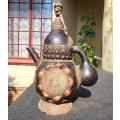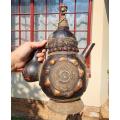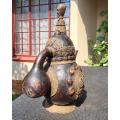This auction has been won.
View other items offered by ErnRex15453254
Leading
MaggiDercksen3511687
1 ×
R421.00
15 May 20:44
Runners-up
VutMab769256
1 ×
R391.00
15 May 20:00
Assiram191
1 ×
R61.00
15 May 12:29
thesmith1169
1 ×
R1.00
14 May 12:40
Luba DRC Tribal Gourd Calabash Water Pitcher with Figural Head Carved Wooden Stopper
1 was
available
/ secondhand
Shipping
Standard courier shipping from R30
R30 Standard shipping using one of our trusted couriers applies to most areas in South Africa. Some areas may attract a R30 surcharge. This will be calculated at checkout if applicable.
Check my rate
Check my rate
Free collection from
Doornpoort, Pretoria
The seller allows collection for this item and will be in contact with the full collection address once the order is ready.
Ready for collection by Wednesday, 12 June.
Ready to ship in
The seller has indicated that they will usually have this item
ready to ship within 7 business days. Shipping time depends on your delivery address. The most
accurate delivery time will be calculated at checkout, but in
general, the following shipping times apply:
Standard Delivery
| Main centres: | 1-3 business days |
| Regional areas: | 3-4 business days |
| Remote areas: | 3-5 business days |
Seller
Buyer Protection
Product details
Condition
Secondhand
Location
South Africa
Origin
North African Colonial
Customer ratings:
Bob Shop ID
615367402
Luba DRC Tribal Gourd Calabash Water Pitcher with Figural Head Carved Wooden Stopper
A UNIQUE LUBA TRIBAL GOURD CALABASH WATER PITCHER. MADE IN THE DEMOCRATIC REPUBLIC OF THE CONGO, USING A CARVED GOURD. EMBELLISHED WITH SEA SHELLS AND CORD WRAPPINGS. INTERESTINGLY IT HAS A FIGURAL HEAD CARVED WOODEN STOPPER.
IT IS FULLY FUNCTIONAL BUT ALSO BEAUTIFUL. IT APPEARS OLD AND I WOULD ESTIMATE IT TO BE FROM THE 1950S BELGIAN CONGO ERA.
Across much of East Africa from Ethiopia to South Africa and west to the Congo basin calabashes are cultivated, trained into useful shapes, hollowed out and fashioned into containers. In traditional societies they were often hung from the rafters and on the walls of huts where they housed everything from fermenting beverages to honey and medicinal elixirs and powders.
When it came to housing medicinal substances the calabash became something more than a mere container as the effectiveness of its contents required the active involvement of overseeing spirits or powers. They were embellished with beads, shells and other adornments and always closed with carved stoppers. These stoppers may be anthropomorphic, zoomorphic or non-figural, but where nganga (traditional medicine) is involved they are almost never plain.
SIZE: 25CM WIDE FROM SPOUT TO HANDLE 35CM HIGH UP TO FINIAL
CONDITION: SOME MINOR DAMAGE TO GOURD ON UNDERSIDE. STILL IN GOOD CONDITION.
NOTE I HAVE VARIOUS INTERSTING AFRICAN ARTIFACTS ON AUCTION THIS WEEK. STRANGE WOODEN CARVED BOWLS AND GOURDS TO OLD AFRICAN POTTERY LAMPS AND MUSICAL INSTRUMENTS. ALSO AN AFRICAN LUBA DRC PIPE.
LUBA PEOPLE OF THE DRC:
The Luba Empire was one of the most-renowned African states. Archaeologists have shown that the area where the heart of the empire was situated, east of the Kasai River around the headwaters of the Lualaba River (hence the name Luba people) was likely inhabited by the 5th century CE, with the beginnings of the empire emerging by the 14th century. In the 16th and 17th centuries, most of the Luba were ruled by a paramount chief. The Luba empire was fragmented by Belgian colonization between 1880 and 1960, and the breakdown of the empire resulted in the development either of smaller chiefdoms.
The Luba are savanna and forest dwellers who practice hunting, food gathering, and agriculture (cassava, maize), keep small livestock, and live in villages of a single street, with rectangular thatched-roof huts along either side. They fish the Congo River and its main tributaries intensively. Luba practice circumcision and womens initiation; they have associations for hunting, magic, and medicine. They are renowned wood-carvers and they are especially known for their carvings of anthropomorphic figures (animals having human characteristics), ceremonial axes, and headrests.
CALABASH AND COWRIE SHELL IMPORTANCE:
A gourd or calabash served as an important divination implement for members of the Luba society. This society was considered a reliable source of medical knowledge, and the calabashes were used in the society's healing activities. Used in initiation rituals, power items would be placed & stored inside the gourd.
The protective spirit of the society was represented by a gourd filled with powerful medicines and topped by a carved figure. During initiations, novices would place in the gourd certain secret items that would accumulate over time until the assemblage acquired a power far greater than any of its parts. The gesture of the female figure is a sign of the secrets women keep within them.
These guards were often embellished with cowrie shells. In Africa cowrie shells were used as currency in the past and known as the worthiest ones. As a currency, these were commonly being used in the various parts of Africa. Due to this, the cowrie shells are also been recognized as prosperity.
PLEASE ALSO SEE MY OTHER ITEMS LISTED. I HAVE SOME OTHER INTERESTING ITEMS ON AUCTION THIS WEEK. COPY THE URL UNDERNEATH AND PASTE INTO GOOGLE AND IT WILL TAKE YOU DIRECTLY TO ALL MY LISTINGS THIS WEEK. NOTE ALL MY AUCTIONS END AT 22H30 SO IT IS ADVISABLE TO PUT IN AN AUTOMATIC BID (HIGHEST PRICE YOU ARE WILLING TO PAY) EARLY.
HTTPS://WWW.BIDORBUY.CO.ZA/SELLER/3685641/ERNREX1545















